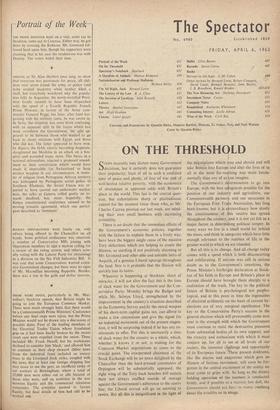ON THE THRESHOLD S TERN necessity may dictate many Government decisions,
but it certainly does not guarantee their popularity; least of all in such a confused time of peace and plenty, of fear of war and of well-heeled relative poverty, ,.vith the economics of abundance at apparent odds with Britain's place in the world. This last is the central ques- tion, but exhortations sharp or platitudinous cannot for the moment rouse those who, as Mr. Charles Curran pointed out last week, are mind- ing their own small business with increasing irritability.
There is no doubt that the immediate effects of the Government's economic policies, together with the failure to explain them in a lively way, have been the biggest single cause of the massive Tory defections which are helping to create the illusion; so startling if not positively alarming to Mr. Grimond and other able and amiable heirs of Asquith, of a genuine Liberal upsurge throughout the land. Nor is it probable that the illusion will quickly lose its lustre.
Whatever is happening at Stockton, short of miracles, it will not alter the fact this is the time of slack water for the Government and the Con- servative Party. Monday brings the Budget and while Mr. Selwyn Lloyd, strengthened by the improvement in the country's situation described in the Economic Survey and by the moral weapon of his short-term capital gains tax, can afford to make a few concessions and give the signal for an industrial movement out of the present stagna- tion, it will be surprising indeed if he has any ex- citements to offer. For this is necessarily a time of slack water for the country as a whole, which, whether it knows it or not, is waiting for the Common Market negotiations to come to the crucial point. The exasperated chairman of the Stock Exchange will be no more delighted by the Chancellor than the hard-pressed commuters of Orpington will be substantially appeased; the right wing of the Tory back benches will sustain their not always muffled sounds of outrage against the Government's adherence to the centre line; the Liberal revival will go on seeming to revive. But all this is insignificant in the light of
the negotiations which may and should and will take Britain into Europe and alter the lives of us, all in the most far-reahing way more funda- mentally than any of us 'Fan imagine.
The Government's dStermination to go into Europe, with the best safeguards possible for the
position of our industry and agriculture, our Commonwealth partneq, and our associates in the European Free Track Association, has long
been known; but it is atraordinary how slowly the consciousness of this resolve has spread throughout the country,,and it is not yet felt as a major factor in determining political temper. In many ways we live in a small world far behind the times, and think in categories which have little enough relevance to the realities of life in the greater world in which we are islanded.
But all this is to change. And all change today comes with a speed which is both disconcerting and exhilarating. If anyone was still in serious doubt as to the Government's intentions, the Prime Minister's forthright declaration at Stock- ton of his faith in Europe and Britain's place in
europe should have brought them sharply to a realisation of the truth. The key to the political
future of Britain is psychological not psepho- logical, and at this point in time the ingenuities of electoral arithmetic on the basis of current by- elections are of very marginal significance. The key to the Conservative Party's success in the general election which will presumably come next year is the strength with which the Government must continue to resist the destructive pressures from substantial bodies of its own support, and the vivacity and enthusiasm with which it must conjure up, for all to see at all levels of our society, the immense challenge and opportunity of its European future. These present doldrums,' like the alarms and excursions which give an illusion of furious movement, will soon be for- gotten in the central excitement of the reality we must come to grips with. So long as the dreary holding operation of the moment is conducted firmly, and if possible in a manlier less dull, the Government should not have to worry overlong about the wrinkles on its image.


































 Previous page
Previous page